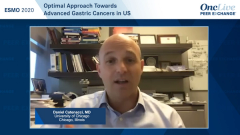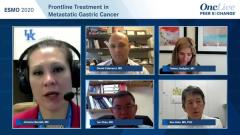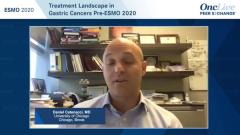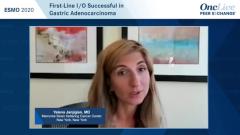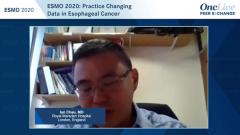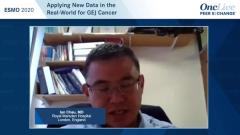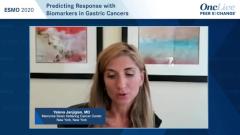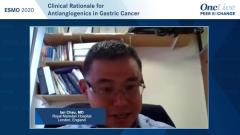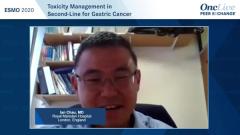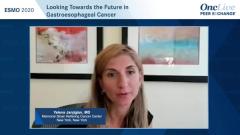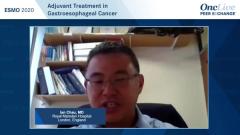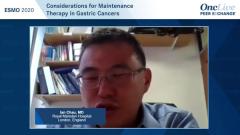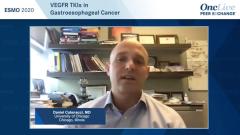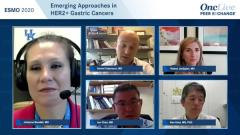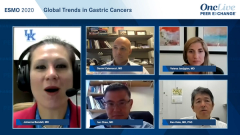
Toxicity Management in Second Line for Gastric Cancer
Episodes in this series

Transcript:
Johanna Bendell, MD: Dan, you’ve done some work with irinotecan-based therapies and ramucirumab. What if there is a neurotoxicity that continues? What about changing out the chemotherapy? Tell us a little bit about some work on irinotecan-based regimens with ramucirumab.
Daniel Catenacci, MD: Sure. I think Ian hit it with the RAINBOW study [NCT01170663] setting the standard with paclitaxel and ramucirumab. Now, even if immunotherapies are added in first line, it’s really not going to change what we do in second line. That said, as you mentioned, there are alternatives to using the paclitaxel backbone. Why would one consider doing that in the first place? Well, we all experience with our patients having neuropathy from the oxaliplatin previously in first line. We also have platinum- and taxane-based perioperative approaches with FLOT [fluorouracil, leucovorin, oxaliplatin, docetaxel] or with carbotaxol [carboplatin/paclitaxel]. Then patients who have quick recurrence within 6 months, we often consider those patients as having that as their first line and what to do next. Are we going to give them more taxane? They just progressed on it. In addition, paclitaxel is weekly, and other regimens can be more convenient in having to come less frequently. So that said, that’s the introduction for what other backbone. FOLFIRI [folinic acid, fluorouracil, and irinotecan], I have preferred that for all of those reasons I just mentioned since the approval of ramucirumab in second line.
We actually had published a retrospective analysis on their outcomes, and it’s essentially as you would expect, very similar to what you would see with paclitaxel/ramucirumab, and actually that led to NCCN [National Comprehensive Cancer Network] guideline approval in January of this year as an option for second line.
Now, we have randomized phase 2 data that came out at ASCO [the American Society of Clinical Oncology annual meeting] this year with the RAMIRIS study [NCT03081143], which was done in Europe; it was randomized of paclitaxel/ramucirumab versus folinic acid, fluorouracil, and irinotecan/ramucirumab. As expected, the outcomes were similar between the 2 arms, and in fact, trended in favor, particularly in patients with prior taxane exposure, as would be logical. For me, especially now we have phase 3 data in second line in colon with folinic acid, fluorouracil, and irinotecan/ramucirumab to show safety, and we have these data. It’s for me very reassuring that we can use that as an option, and it’s always good to have choice for our patients.
Johanna Bendell, MD: Absolutely. We see a lot of patients with gastroesophageal cancers having issues with bleeding tumors. Do you have any concern about the utilization of ramucirumab for patients who might have bleeding or a slow leak from their gastric cancer? Ian, any thoughts there?
Ian Chau, MD: We published a meta-analysis of ramucirumab. We compared to placebo. There’s a reduced incidence of bleeding and even GI [gastrointestinal] bleeding. Obviously, some of those data are not in gastric or colorectal, but they were included. Whereas it is a cause-effect, the bleeding risk is less problematic than bevacizumab. Having said that, if someone is bleeding, we try to see whether we can control that with some palliative radiation to stop the bleeding. Once it’s controlled, then we usually feel comfortable to use ramucirumab. That, to me, is not a major issue.
Going on Dan’s point about the different backbone, the neuropathy, all these things do affect patients’ quality of life, so having a different backbone with ramucirumab will increase the exposure of our patients to more effective second-line treatment, especially in Europe. I’m sure in the United States, perioperative chemotherapy with FLOT [fluorouracil, leucovorin, oxaliplatin, docetaxel] is standard of care, and it is a big problem when they progress on fluorouracil, leucovorin, oxaliplatin, docetaxel, shortly after fluorouracil, leucovorin, oxaliplatin, docetaxel. You’ve used up all these drugs, what are we going to do? Having more data of folinic acid, fluorouracil, and irinotecan or irinotecan plus ramucirumab in that setting, I think it gets us thinking about how treating gastric cancer is all about continuum of care, like colorectal cancer. How do we maximize exposure to all the active drugs for patients while preserving their quality of life?
Johanna Bendell, MD: One drug we haven’t mentioned yet is TAS-102, yet another instrument in our armamentarium to treat gastroesophageal cancers. Ken, can you tell us a little bit about TAS-102 for gastric cancer? Is that utilized a lot in Japan?
Ken Kato, MD, PhD: In Japan, nivolumab is used for third-line treatment for patients with gastric cancer, and even after failure of nivolumab, the so-called fourth-line treatment. Even in Japan, less than 20% of patients get to the fourth-line regimen. Then, some of the patients have metastasis, and they cannot take the drug orally. TAS-102 is one of the options for the subsequent line for gastric cancer, for the patient who appears to be in good condition even after the fourth or fifth line. So it’s one option. Not too many patients can reach the TAS-102.
Transcript Edited for Clarity


